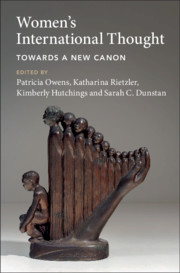Book contents
- Women’s International Thought: Towards a New Canon
- Women’s International Thought: Towards a New Canon
- Copyright page
- Contents
- Preface and Acknowledgments
- Introduction
- 1 Field and Discipline
- 2 Geopolitics and War
- From Influences of Geographic Environment on the Basis of Ratzel’s System of Anthropo-Geography (1911)
- From “The Fascist World War (Ethiopia and Spain)” (1935)
- From The Mediterranean in Politics (1938)
- From Toward a New Order of Sea Power (co-authored with Harold Sprout) (1940)
- From “What We Must Now Do about India” (1942)
- From “The Question of War” (1958–1959)
- From Pearl Harbor: Warning and Decision (1960)
- From Vietnam (1967)
- Ellen Churchill Semple
- Sylvia Pankhurst
- Elizabeth Monroe
- Margaret Sprout
- Claudia Jones
- Hannah Arendt
- Roberta Wohlstetter
- Mary McCarthy
- 3 Imperialism
- 4 Anticolonialism
- 5 International Law and International Organization
- 6 Diplomacy and Foreign Policy
- 7 World Peace
- 8 World Economy
- 9 Men, Women, and Gender
- 10 Public Opinion and Education
- 11 Population, Nation, Immigration
- 12 Technology, Progress, and Environment
- 13 Religion and Ethics
- Index
Mary McCarthy
from 2 - Geopolitics and War
Published online by Cambridge University Press: 12 April 2022
- Women’s International Thought: Towards a New Canon
- Women’s International Thought: Towards a New Canon
- Copyright page
- Contents
- Preface and Acknowledgments
- Introduction
- 1 Field and Discipline
- 2 Geopolitics and War
- From Influences of Geographic Environment on the Basis of Ratzel’s System of Anthropo-Geography (1911)
- From “The Fascist World War (Ethiopia and Spain)” (1935)
- From The Mediterranean in Politics (1938)
- From Toward a New Order of Sea Power (co-authored with Harold Sprout) (1940)
- From “What We Must Now Do about India” (1942)
- From “The Question of War” (1958–1959)
- From Pearl Harbor: Warning and Decision (1960)
- From Vietnam (1967)
- Ellen Churchill Semple
- Sylvia Pankhurst
- Elizabeth Monroe
- Margaret Sprout
- Claudia Jones
- Hannah Arendt
- Roberta Wohlstetter
- Mary McCarthy
- 3 Imperialism
- 4 Anticolonialism
- 5 International Law and International Organization
- 6 Diplomacy and Foreign Policy
- 7 World Peace
- 8 World Economy
- 9 Men, Women, and Gender
- 10 Public Opinion and Education
- 11 Population, Nation, Immigration
- 12 Technology, Progress, and Environment
- 13 Religion and Ethics
- Index
Summary
The war, they say, is not going to be won in Saigon, nor on the battlefield, but in the villages and hamlets. This idea, by now trite (it was first discovered in Diem’s time and has been rebaptized under a number of names – New Life Hamlets, Rural Construction, Counter Insurgency, Nation-Building, Revolutionary Development, the Hearts and Minds Program), is the main source of inspiration for the various teams of missionaries, military and civilian, who think they are engaged in a crusade. Not just a crusade against Communism, but something positive. Back in the fifties and early sixties, the war was presented as an investment: the taxpayer was persuaded that if he stopped Communism now in Vietnam, he would not have to keep stopping it in Thailand, Burma, etc. That was the domino theory, which our leading statesmen today, quite comically, are busy repudiating before Congressional committees – suddenly nobody will admit to ever having been an advocate of it. The notion of a costly investment that will save money in the end has a natural appeal to a nation of homeowners, but now the assertion of an American “interest” in Vietnam has begun to look too speculative as the stake increases (“When is it going to pay off?”) and also too squalid as the war daily becomes more savage and destructive. Hence the “other” war, proclaimed by President Johnson in Honolulu, which is simultaneously pictured as a strategy for winning War Number One and as a top priority in itself. Indeed, in Vietnam, there are moments when the “other” war seems to be viewed as the sole reason for the American presence, and it is certainly more congenial to American officials, brimming with public spirit, than the war they are launching from the skies. Americans do not like to be negative, and the “other” war is constructive.
- Type
- Chapter
- Information
- Women's International Thought: Towards a New Canon , pp. 121 - 126Publisher: Cambridge University PressPrint publication year: 2022



